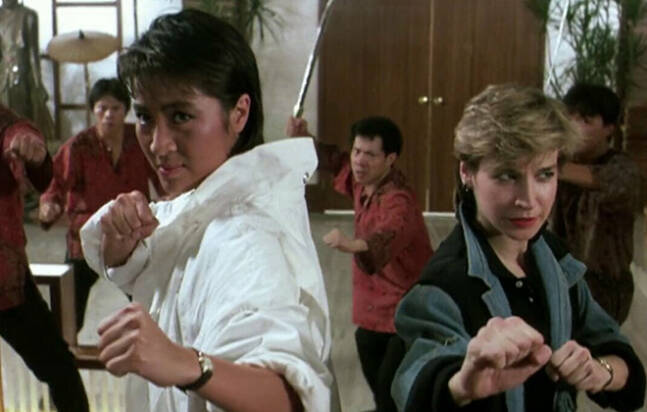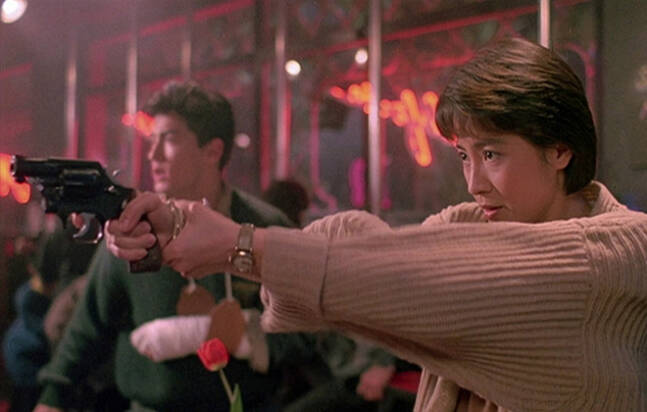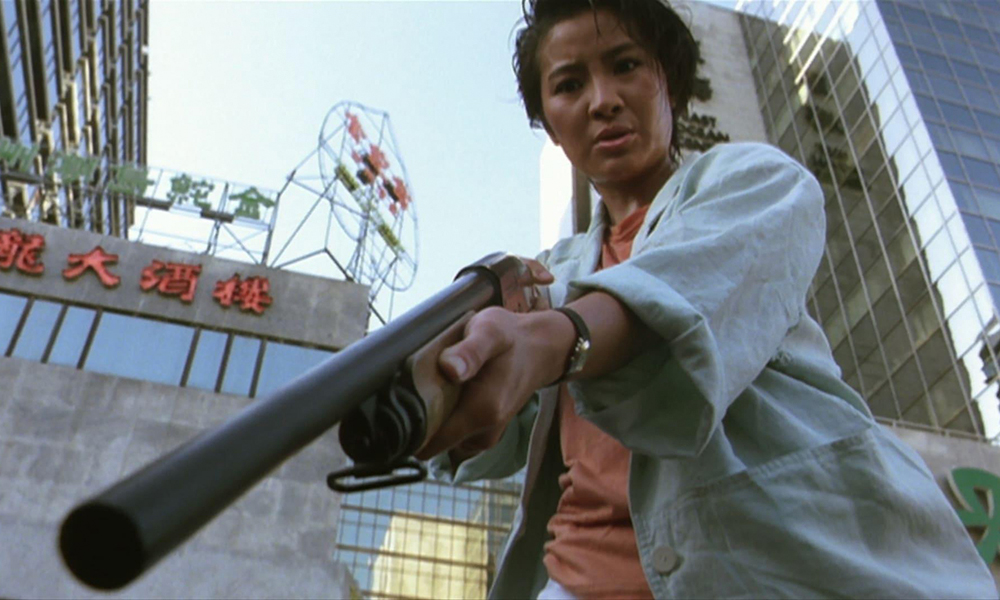Action cinema’s “girls with guns” subgenre seems an unlikely source of prestige, going by name alone, and the bodies that arbitrate movies’ cultural value – the Academy of Motion Picture Arts and Sciences, for instance – seem to agree. Institutions like AMPAS rarely honor action films of any sort, save for undisputed all-timers: Enter the Dragon, The Matrix, Die Hard, The Terminator. Acknowledging movies of the “girls with gun” variety, where the lurid promise that you will, in fact, get what you pay for pays off with girls, some guns, and lots of punching and kicking, is clearly a bridge too far for them.
Fortunately, 88 Films is all too happy to recognize the worth of movies that blend these qualities into a heady sip of comely ass-kicking: Their recent In The Line Of Duty I-IV box set, packing the first four entries of the In the Line of Duty series (or, depending on who you ask, the only four), marks the birth of the “girls with guns” subgenre, and by consequence the birth of recently minted Oscar winner Michelle Yeoh’s career.
Lesson learned: Prestige knows no boundaries. Yeoh, after all, isn’t only Hong Kong cinema royalty; she’s big screen royalty, pop culture royalty, a personality whose eminence can’t be constrained by genre or fart-sniffing debates about high and low art. If legends like her can find their breakout role in films like Corey Yuen’s Yes, Madam, then it stands to reason that the Yes, Madams of the world have innate value, because without Yes, Madam, where would Yeoh be today? Cut that title from her body of work, and her career might have gone differently. She might have missed future opportunities to show audiences around the world her Michelle Yeoh-ness. She might not have that Oscar. She might not be an icon.

“Yes, Madam” (1985)
All of that, spun out of one fish-out-of-water team-up cop picture, where Yeoh’s Hong Kong inspector, Ng, partners with Scottish inspector Carrie Morris (Cynthia Rothrock, another of action cinema’s greats) to recover a piece of microfilm with proof of businessman Tin’s (James Tien) illegal doings. Yes, Madam’s premise is simple as can be, abetted by fight sequences that almost 40 years on remain untouched by swaths of action films that have come since, and mellowed out by confidently silly bits in between the violence.
The film is serious, but not self-serious: Yuen’s goal is to entertain, so he balances out a light overarching tone with a determined approach to his fight choreography. Yes, Madam, just like the other In the Line of Duty films collected here – Royal Warriors, In the Line of Duty III, and In the Line of Duty IV – is a bloody and remorseless piece of work. Slapstick comedy and goofball humor occupies the moments separating each fight sequence almost out of necessity; it feels like Yuen is trying to make a point about what his characters are fighting for in the first place.
This actually makes the film a perfect reflection of who Yeoh is as a performer. Asperin and Strepsil (Hoi Mang and John Sham, respectively), Yes, Madam’s comic relief characters, are horrified by the extremities of violence they’re exposed to as mere pickpockets. It’s one thing to steal valuables, and another to beat a man to death for failing to make an adequate phony passport. As Ng, Yeoh is spared having to comment on the relative morality of theft versus murder because her body language and expression say everything that needs to be. Ng is a woman of law, but she isn’t without compassion, and Yeoh marries both sides of her character through no-nonsense line delivery and playful physicality. She’s a bit like a cat batting around outmatched mice.
Yeoh carries this persona through 1986’s Royal Warriors, where she plays another Hong Kong cop, Yip, partnered with a wiseass Casanova wannabe, Michael (Michael Wong), caught in the crosshairs of ex-military blood brothers out for revenge. Director David Chung opens the film with a plane hijacking as Yip and Michael attempt to transport a mobster back to Hong Kong from Tokyo; one of his former comrades tries to rescue him, but they’re fatally thwarted by Yip, Michael, and the intervention of a soon-to-be-retired Tokyo policeman, Yamamoto, played by Hiroyuki Sanada.

“Royal Warriors” (1986)
Sanada’s name will ring familiar to anyone who’s seen The Last Ship, or the 2021 Mortal Kombat movie, or much more recently than that, John Wick: Chapter 4, where he plays the manager of a hotel in Osaka – an assassins’s hotel. You’ll find another name relevant to In the Line of Duty in John Wick: Chapter 4, too: Donnie Yen, starring as a blind hit man forced out of retirement to kill John.
Like Yeoh, Yen and Sanada enjoy big old heaps of cultural cachet today that they didn’t back in 1986 and 1989, the year In the Line of Duty IV premiered: Unlike Yeoh, neither of them have been the center of an awards season campaign, though they’ve both been in Oscar-nominated films: Yen in 2002’s Hero, and Sanda in 2003’s The Last Samurai. (Sanada, of course, should have been nominated for his magnificent performance in 2002’s The Twilight Samurai, a film that’s crying out for rediscovery as he continues adding bangers to his credits.) The common thread here is the In the Line of Duty series, a stepping stone for each of them on their way to greater things, and a surprising locus for martial arts cinema luminaries.
Then again, maybe it isn’t a surprise at all. 88 Films wasn’t about to put a bunch of bad movies out under their banner; they’ve put the four In the Line of Duty films that matter in one handsome package and given them the restorative TLC they deserved, so we can appreciate them either afresh or for the first time. Arguably, Yeoh, Yen, and Sanada don’t need new audiences the way Cynthia Khan, the lead in both In the Line of Duty III and IV, does. It’s not that she’s hurting for success as much as her career hasn’t taken her to the same places as her peers; she’s every bit an essential name in action cinema as they are. The set takes the incidental stance that if Yeoh, Yen, and Sanada can achieve international stardom, then Khan can, too, or at least should.
If not, fine: Her reputation is secure. She, too, is significant to Hong Kong action, to the extent that Hong Kong action wouldn’t be the same without her. But Khan is a girl with a gun, Yeoh is a girl with a gun, and, yes, fine, Yen and Sanada are guys with guns, and the In the Line of Duty films are reminders that even the greats can come from humble, even disreputable origins.




